人教版高中英语必修二教学案unit3Computers
人教版高中英语必修2《Unit3Computers》教案
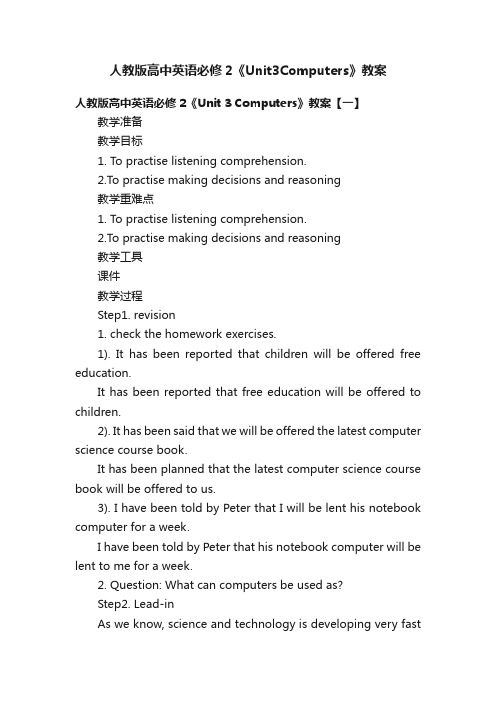
人教版高中英语必修2《Unit3Computers》教案人教版高中英语必修2《Unit 3 Computers》教案【一】教学准备教学目标1. To practise listening comprehension.2.To practise making decisions and reasoning教学重难点1. To practise listening comprehension.2.To practise making decisions and reasoning教学工具课件教学过程Step1. revision1. check the homework exercises.1). It has been reported that children will be offered free education.It has been reported that free education will be offered to children.2). It has been said that we will be offered the latest computer science course book.It has been planned that the latest computer science course book will be offered to us.3). I have been told by Peter that I will be lent his notebook computer for a week.I have been told by Peter that his notebook computer will be lent to me for a week.2. Question: What can computers be used as?Step2. Lead-inAs we know, science and technology is developing very fastand computers have become smaller and smaller. They have been used in many fields. So, the 21st century is the century of information technology What does it mean? Does information technology/ IT only mean things like computers? Of cause not. Actually, it means more than computers. Computers are just one kind of IT. What else do you know is part of IT?(TV, radio, CD-ROM, DVD, books……)Step3. Listening (SB)1. Pre-listening: What are the changes brought by different forms of IT ?What are the advantages and disadvantages of them ?2. While-listening:Go through the chart and make sure the students look at the chart before they listen to the tape. (This is to sharpen their attention and listen for the answers. This will also help them get the gist of the text.) Then Listen to the tape and finish filling in the chart. (If necessary, play the tape for several times.) Say: After listening to their talk, we know all kinds of IT have both disadvantages and advantages.Let’s check the answers together.Type of IT Advantages DisadvantagesTV You can both listen and watch. You cannot write to friends.Web You can find information. It is very expensive.Radio You can listen to English. You cannot watch a film.Book You can get information. Sometimes it is out of date.3. Post-listening:1) (pair work): decide which type of IT is best for you to use right now. Make your choice and give your reasons by using the following expressions.I think that….In my opinion, ….I believe that….I agree because….I disagree because….I’ve decided that….2) (group work): Discussion :Computers are useful and have brought us lots of good things, but they also cause bad effects. What attitude should we have towards the computer? (Make good use of it but never get trapped by it.)Step4. Speaking1. Pre-speakingSay: From what we have learn, we should admit that computers and the web have a great influence on the school education as well as people’s life. It has come into people’s everyday life and many families hold computers in their homes. Now there is a task for you.2. While-speaking1) Situation: You have been asked by your parents to help choose computers for your home. You and your friend have looked at several computers. Talk about the special things each computer can do. Make a decision about which kind of computer to buy and explain why.Information input: Show students some pictures of different computers (desktop computer & laptop computer & …) Language input: Useful expressions (Repeat it to strengthen students’ ability of use it.)Supporting an opinion Challenging an opinionI think that … , because … Perhaps, but what if / about …?First, … Have you thought about …?One reason is that … What makes you think that …?I think it is better because… I don’t like it because….(Pair work )Use the expressions to support your opinion or challenging other’s opinions.2) Oral report: (individual work )Do an oral report to your father and start your report like this: I looked at many different computers. The one I have chosen is the PEP personal computer. One of the main reasons is that it is suitable for homes. I found that…3. Post-speakingConclusion—What useful expression do we use to make a decision and reason?(In this way, they can review and use the words and phrases again.)Step6 Pre-writingSay: Imagine what problems and delights this android might have to deal with while it is serving you. Try yourself in someone else’s shoes is an important way of understanding how other people feel.Then discuss: You are an android. You work for a family with one child who is very spoiled. The parents want you to do everything for them. The parents are nice, but they often ask you to watch over their child. How do you feel? What would you do if the child asked you to do his/her homework for him/her? Would you ever tell the chi ld “no”?Step7 WritingSay: Write a passage about the result of your discussion! It should contain:What do you have to do?What is the child like?What is the parents’ requirement of the child?What do the parents want you to do?What does the child want you to do?Then what will you do? How do you feel?Sample writing:Hello everybody, my name is Liu Yan.I am a 321 model android.I work for the Li family. Mr and Mrs Li work very hard too.Mr Li is an architect and designs great tall apartment blocks.Mrs Li is a doctor and has to look after many patients.I remember all the plans for Mr Li's projects and can tell Mrs Li which drugs are the best to give any particular patient. And I also look after their library. I store all the books that they borrow from their school or friends in my brain.Of course my brain is as large as a mountain, so work like that is no trouble to me.I really eat books just like people eat food.The Lis have a child who is very spoiled. He needs me to remember all his school textbooks so that I can do his homework for him.He just gives me the information on the subject, what has to be done and the page numbers and I get on with it while he enjoys himself with his friends.Sometimes I don't think it is right to do his homework for him — it's somewhat cheating. However, his parents are very concerned at the pressure of work in school these days.The child has too much homework to do. They like him to go to the key school but they also want him to be able to have hobbies, learn to swim and keep fit! Poor child!So they consider me the most important person in the family after themselves.I am always introduced to their friends and play with visiting children.I am the perfect family academic aid and, although I was not cheap to buy, Mr Li says I was worth every yuan!Step8 AssessmentGet the students to assess their writing ability according to the following the questions:1. Is your composition well developed?2. Are your ideas well organized to the point?3. Do you have a good choice of words and idioms in your writing?4. Do you get a good mastery of complex structures of language?5. What kind of mistakes have you made in your writing?Step9: HomeworkWrite about your discussion. You may begin like this:Hello, everyone. My name is ___. I’m 321 m odel android. I work for the Li family….课后小结学了这节课,你有什么收获?课后习题完成课后习题一、二。
Unit 3 Computers教学设计 ( 人教高中英语必修2)

Unit 3 Computers本堂课包括Warming up 和 Reading 两部分。
他们是语言知识和文化意识的输入过程;是语言技能、情感态度和学习策略的培养过程,也是语言输出过程。
在整个教学过程中,它是培养学生阅读能力的主要过程,教学重点是阅读技能的培养、交际能力及情感态度的提升。
Warming up 部分根据每个人对电脑的看法不同让学生就“Do you like computer?”进行小组探究和讨论,从自身实际出发谈论自己的看法,有助于激发学生对于整个单元的学习兴趣。
Reading 部分(Computers )主要讲述的是电脑的发展史,通过一系列问题的设置让学生能够在全面理解文章的基础上提高信息处理、加工和学习的能力。
Knowledge objectives:掌握以下词语和句型:Calculate, sum, solve, simplify, artificial, intelligence, revolution, reality, totally, application, finance, in common, over time, as a result, from···on, so···that. Ability objectives:训练学生一定的阅读技巧,使他们掌握一些有效的学习策略,从而提高阅读速度和篇章理解的准确性,并养成一定的自主学习能力;培养学生快速阅读的能力、捕捉信息的能力及运用语言进行交际的能力。
Emotion objectives:通过对“computer”的学习,启发学生思考电脑给我们带来的影响,从而以一种正确的方式利用电脑和网络资源;另外通过电脑的发展历程让学生意识到科技对生活的影响。
1. 教学重点:1.了解计算机的发展过程,进一步认识计算机的演变以及对人类的影响。
2.训练学生的阅读技巧,提高学生阅读速度和理解能力。
高级中学高中英语(人教版)必修二学案:Unit 3 Computers教学案
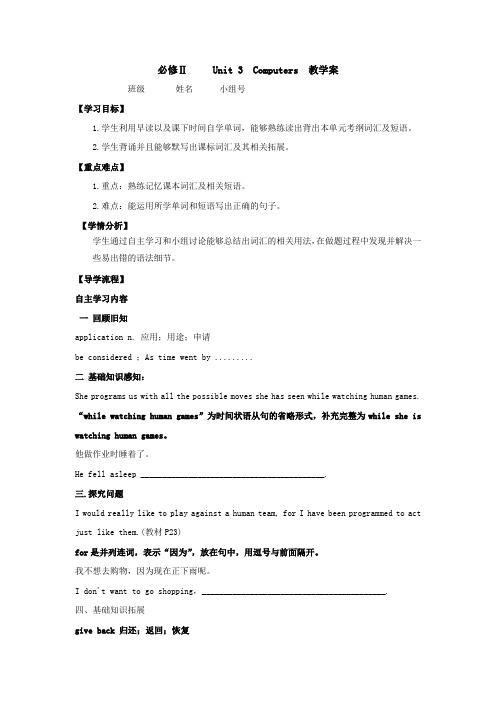
必修Ⅱ Unit 3 Computers 教学案班级姓名小组号【学习目标】1.学生利用早读以及课下时间自学单词,能够熟练读出背出本单元考纲词汇及短语。
2.学生背诵并且能够默写出课标词汇及其相关拓展。
【重点难点】1.重点:熟练记忆课本词汇及相关短语。
2.难点:能运用所学单词和短语写出正确的句子。
【学情分析】学生通过自主学习和小组讨论能够总结出词汇的相关用法,在做题过程中发现并解决一些易出错的语法细节。
【导学流程】自主学习内容一回顾旧知application n. 应用;用途;申请be considered ;As time went by .........二基础知识感知:She programs us with all the possible moves she has seen while watching human games. “while watching human games”为时间状语从句的省略形式,补充完整为while she is watching human games。
他做作业时睡着了。
He fell asleep __________________________________________.三.探究问题I would really like to play against a human team, for I have been programmed to act just like them.(教材P23)for是并列连词,表示“因为”,放在句中,用逗号与前面隔开。
我不想去购物,因为现在正下雨呢。
I don't want to go shopping,__________________________________________.四、基础知识拓展give back 归还;返回;恢复give away 捐赠;赠送;分送;颁发;泄露;暴露give in 呈交;屈服;让步give out 分发;耗尽;公布,宣布;发出(光、热或信号)give up 放弃;投降give way to 让……先行;被……代替与迁移:请及时记录自主学习过程中的疑难:小组讨论问题预设:(1)in a way=in one way在某种程度上(2)相关短语:in the/one's way 妨碍;挡道in this/that way 用这种/那种方式in no way 绝不on the/one's way 在路上;即将到来by the way 顺便说/问一下①The rainy weather helped me in___________way, which gave me a good excuse to refuse to go to this party or that.②There was a big truck in___________ way.提问展示问题预设:课文中的知识点及重难点词汇短语课堂训练问题预设:①The headmaster____________________the prizes at the school sports day.校长在校运动会那天颁发了奖项。
人教新课标高中英语必修二Unit 3 Computers教案
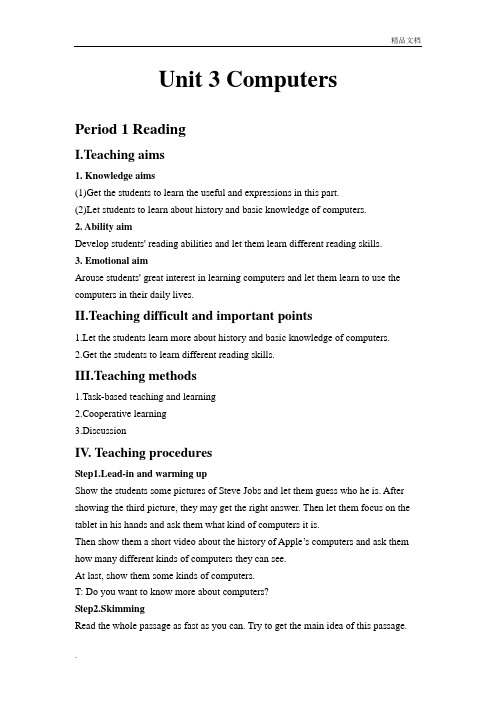
Unit 3 ComputersPeriod 1 ReadingI.Teaching aims1. Knowledge aims(1)Get the students to learn the useful and expressions in this part.(2)Let students to learn about history and basic knowledge of computers.2. Ability aimDevelop students' reading abilities and let them learn different reading skills.3. Emotional aimArouse students' great interest in learning computers and let them learn to use the computers in their daily lives.II.Teaching difficult and important points1.Let the students learn more about history and basic knowledge of computers.2.Get the students to learn different reading skills.III.Teaching methods1.Task-based teaching and learning2.Cooperative learning3.DiscussionIV. Teaching proceduresStep1.Lead-in and warming upShow the students some pictures of Steve Jobs and let them guess who he is. After showing the third picture, they may get the right answer. Then let them focus on the tablet in his hands and ask them what kind of computers it is.Then show them a short video about the history of Apple’s computers and ask them how many different kinds of computers they can see.At last, show them some kinds of computers.T: Do you want to know more about computers?Step2.SkimmingRead the whole passage as fast as you can.Try to get the main idea of this passage.A. The computer wants to find “who he is”.B. The function (功能) of the computer.C. The computer becomes popular around the world.D. The history and the applications of the computer.Find out the topic sentence of each paragraph and underline them.Step3. Careful-reading Para 1ScanningLet the students read this paragraph carefully and try to finish the following char.T: How could these changes become possible?Step4. Careful-reading Para 2Let the students read paragraph 2 quickly and find the answer to this question. After check the answer, give them one minute to find the five different ways of memory for computers in different periods of time.Step5. Careful-reading Para 3Since the memory of computers has been improved greatly, will them become more powerful and can be used in more fields?Now read the last paragraph and find out the new applications of computers.Step6. Further Reading1.The passage is written by_______ order?2. What is the most used rhetoric (修辞法) in this passage?A. simile(明喻)B. personification (拟人)C. metaphor (暗喻)3. In what ways have computer been changed?Ask some students to summarize. If they have any difficulty, give them some hints. Step7. Activity: Be the next Jobs!We have learned the history of computers and seen the great development of computers. What will the computers be like in the future? Do you want to design your computers as Jobs did? Now try to design your computers.For example:This is the new computer designed by our company.It is very small and transparent(透明的). You can even put it into your pocket. (Shape/color)It has a free-internet in it. You can… (Applications/functions)It only costs you … (Price)Give the students five minutes to prepare and invite some of them to show their ideas. Step8. Homework1. Try to retell the history of computers.2. Read the passage carefully and underline the difficult sentences.。
高中英语Unit3Computers教案新人教版必修2

Unit 3 Computers类别 话题词汇词组、 短语功能语法随堂练习教学目的和要求〔〕Information technologyhistory and basic knowledge of computers robotscalculate calculator PC notebook common analytical simple simple-minded technology technological revolution universal mathematical artificial intelligence anyway totally network truly race birth IT advantage disadvantage type disagree choice material personally create coach move arise brain mop wanderin common in one ’s opin ion go by so ... that ... deal with humanrace in a way make up with the help of after all watch over1. 做出决定〔 Making decisions〕I think that ... In my opinion ... I believe that ...Let ’ s make our decision.I ’ ve decided that ...2. 推理〔 Reasoning 〕The advantage/disadvantage is ...What ’s your reason? Why do you think so?I think this one is better because ...I don ’t like this one because ...现在完成时的被动语态结构和用法I have been made smaller and smaller.I have been used by millions of people.I have truly been built to help the human race.1、 Go over the story and discuss with your partner who the speaker is in thisstory.Now write down three sentences from the story to support your idea. It is a computer because it describes :Itselfas the analyticalmachine designed by CharlesBabbage 〔 which was the firstdesign of a computer 〕. Then in 1822 I was builtas an AnalyticalMachine by CharlesBabbage.Alan Turing as its real father 〔 and he designed thefirstreal computer 〕 . “ Myreal father was Alan Turing ...〞Having artificial intelligence〔 which only computers have 〕 . People have naturalintelligence.“ However, people thoughtI was simple-mindeduntilthey discoveredI had ‘artificial intelligence’ . 〞课程标准要求掌握的工程 ;Teaching aims and demands2、 Look at the timeline below.Fillin the blanks with information from the reading above.Timeline1642: The computer began as a calculating machine.1822: The Analytical Machine was made by Charles Babbage.1936: Alan Turing wrote a book to describe how computers could be made.1960s:Computers had new transistors and became smaller.1960s:The first family of computers was connected to each other.1970s:Computers were brought into people’ s homes.Now: Computers connect people all over the world together.课堂笔记1、 I know this sounds very simple,but at that time it was a technological revolution.我知道这听起来很简单,但是在那个时候这却是一项技术革命。
人教版高中英语必修二UNIT3COMPUTERS教学设计
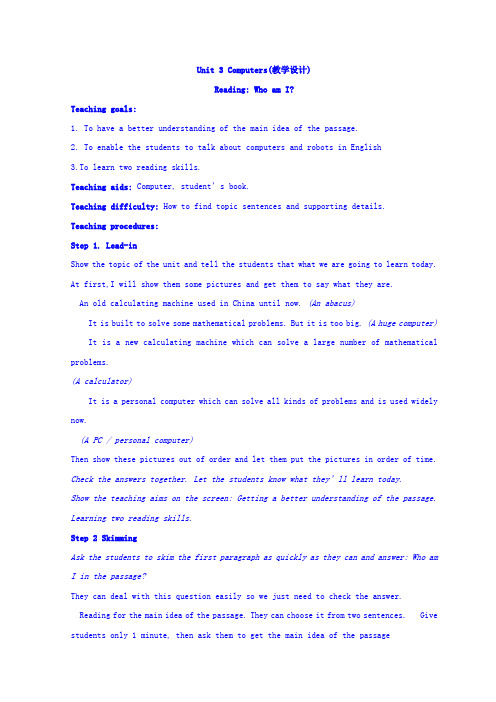
Unit 3 Computers(教学设计)Reading: Who am I?Teaching goals:1. To have a better understanding of the main idea of the passage.2. To enable the students to talk about computers and robots in English3.To learn two reading skills.Teaching aids: Computer, student’s book.Teaching difficulty: How to find topic sentences and supporting details.Teaching procedures:Step 1. Lead-inShow the topic of the unit and tell the students that what we are going to learn today. At first,I will show them some pictures and get them to say what they are.An old calculating machine used in China until now. (An abacus)It is built to solve some mathematical problems. But it is too big. (A huge computer) It is a new calculating machine which can solve a large number of mathematical problems.(A calculator)It is a personal computer which can solve all kinds of problems and is used widely now.(A PC / personal computer)Then show these pictures out of order and let them put the pictures in order of time. Check the answers together. Let the students know what they’ll learn today.Show the teaching aims on the screen: Getting a better understanding of the passage. Learning two reading skills.Step 2 SkimmingAsk the students to skim the first paragraph as quickly as they can and answer: Who am I in the passage?They can deal with this question easily so we just need to check the answer.Reading for the main idea of the passage. They can choose it from two sentences. Give students only 1 minute, then ask them to get the main idea of the passageStep 3 Reading for specific information.At the beginning, explain to the students what topic sentence and supporting details mean. Students can read the explanation on the screen by themselves.As the passage is a bit difficult, I’ll lead the students to find out the topic sentence and supporting details of paragraph 1. Add explanations where necessary.Next, the students should be able to find out the topic sentences and supporting details of paragraphs 2 and 3. Give them several minutes.After finishing the tasks, make a simple summary.As we talk about the development of something, time is very important for us to understand better. Now let’s complete the timeline on page 19. Give them three minutes to finish it individually.A chain of events showing the development of computer / Changes of the machineTimeline1642: ____________________________________________::the Analytical Machine was made by Charles Babbage.1936:_______________________________________________________________________1960s:______________________________________________________________________: the first family of computers was connected to each other.1970s: ______________________________________________________________________Now:_______________________________________________________________________In order to help the students get a better understanding, I’ll show them a short video about the development of computers.Step 4 Post-readingNow we know the development of computers(show the pictures in the right order). Can you guess What’s Next?Give students 2 minutes to talk with parters about What will robots do for us in the future?Then ask some students to share their opinions with us.Summarize like this: Robots are useful in our daily life. For example, it can help us cook, clean the room, wash clothes and accompany us . Also, they can direct the traffic,carry out operations and even do some dangerous jobs.Blow the short summary, I’ll show them two sentences and they are supposed to decide which one is the topic sentence:A.Robots can do a lot of things for us.B.Robots have changed a lot.Step 5 SummaryToday we have learnt:1). the development of computers2) how to find topic sentences and supporting details.Encourage the students to use the reading skills in study.Step 6 Homework1. Read the text aloud and try to retell it in order of time.2. Read the passage again. Underline the sentences that you don’t understand and try to solve the problems using context clues and the dictionary.。
人教版(新课程标准)必修2 Unit 3 Computers 说课(含课教案和教案)
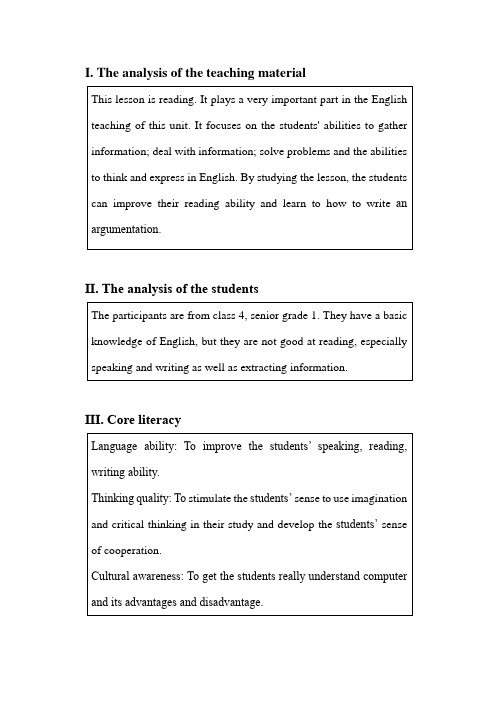
and figure out the following question.
students for
who is the speaker in the story? (class work)
fast reading
To ask the students to get the main idea of the skills to
they gave me a family _______by _______.
Since the 1970s many new ________ have been
found for me. I was used in ________, _______,
and trade. I have also been used to make mobile
phones ________help with _________. Anyway,
my goal is to ______humans _____a life of high
quality. 二.Debate
Topic: Computer is a double-edged sword.
Step5
in 1936 Alan Turing wrote a book and built a what they
_______________.
have learnt.
As time _______, I was made ______but my
Байду номын сангаас
memory got ______ and ______. In the 1960s
conclusion.
and write in
人教版高中英语必修2 Unit 3 Computers第一课时教案

人教版高中英语必修2 Unit 3 Computers第一课时教案Period One Intensive ReadingTeaching Goals:1. Target Languagea. The Key Words and Phrasessimplify logically technological revolution solve from…on personalas a result totally so…that network Web application explore anyhow human raceb. T he Key SentencesOver time my memory has developed so much that, like an elephant, I never forget anything I have been told!And my memory became so large that even I couldn’t believe it!2. Ability Goals:Enable students to learn about the development and history of computers.Teaching Important & Difficult Points:Understand how details are used to support topic sentences.Teaching Methods:Prediction, scanning and discussion.Teaching Procedures & WaysStep I Warming-upT: How many of you have computers in your home? Please put up your hands.Ss :respond accordingly.T: What do you usually do on your computers?Ss:Type documents/homework, listen to music, watch videos, play games, search on the Internet, send mails …T: When I were at your age, I knew nothing about computers. Most Chinese families never heard about it. However, in recent years, computers have become more and more popular, and most families in cities have one or more than one computer in their home. And some families in villages also have their own computers. Computers make life more convenient and colorful. However, it took a long time for humans to have computers that we see today. Now look at the pictures on page 17 and discuss what they have in common. Then think about Questions 2 & 3.Suggested answers:1.These pictures are all technological inventions.2.From these pictures, we know computers have experienced a long development process,and the development will never stop.3.(There may be various answers.)Step II Pre-readingPrediction: Let students predict the content of the passage according to the pictures and the title. This will involve students in active thinking and exploring.Then let them make a list of the ways computers are used today.Sample list: date processing; industrial design; learning and teaching aids; TV program editing; entertainment (watch TV/video, listen to music, play games, online chat…) communication (e-mail, e-card, instant message) …T: Now look at the inventions in activity 3. First check their meanings in your dictionaries. Then put them in the order according to the time when they appeared.Help students understand the meanings of the words: analytical, calculate and universal. Note:Universal machine is also known as Alan Turing's “universal computing machine”, is capable of computing any algorithm.Students may have different answers. They will check it after reading the passage.T: Have you put them in the right order? You will find it after reading the passage. Now turn to page 18 please.Step III ReadingSkimmingGet students read the whole passage and try to get the main idea of it.After readingT: What does “I” in the title refer to?Ss: Computer.T: What is the main idea of the passage?Ss: The passage is mainly about the history and development of computers.ScanningT: Correct! Now read the passage and finish the timeline. With this timeline, you will have a clear idea of the development of computer.Check the answers.T: The passage has three paragraphs. Find out the topic sentence of each paragraph, and the details that are used to support the topic sentences. Then complete the chart in activity 2.the topic sentences are not standing there alone, they are supported with details and date, which make the topic sentences more convincing. Now I will play the tape of this passage. Listen and find out/underline the difficult words and expressions.Teacher gives some explanations.T: What can be “over time” replaced by?Ss: As time goes by.T: How do you understand the word “simplify”? Look! (on the board: simple+-ify). -ify is a suffix which means to turn into, make or become. For example, beautify. So if you know the meaning of “simple”, you can easily get the meaning of “simplify”. Who can tell me its meaning?S: To make something easier or less complicated.T: What does “it” in line 9 refer to?Ss: It refers to the fact that computer was programmed by an operator who used cards with holes.T: Why was Alan Turing called computer’s real father?S: I guess that’s because Alan made computer more powerful, which could solve any difficult mathematical problem.T: What does “this reality” in line 15 refer to?S: It refers to the reality that computer had grown as large as a room.T: In paragraph two, there are two sentences which contain the use of “so…that…” structure. Underline them and study carefully.Show the following on the screen/board:●Over time my memory has developed so much that, like an elephant, I never forgetanything I have been told!●And my memory became so large that even I couldn’t believe it!Help students sum up the form and function of this structure:Form:so + adj./adv. + that + clauseFunction:This structure is used when emphasizing the degree or amount of something by saying what the result is.Step IV DiscussionT: Discuss this question in groups: Why do many countries want to host the Olympic Games while others do not? Use the mind map below to help you. Then prepare for a class discussion. Put forward your ideas and give reasons for your choices.T: Why do many countries want to host the Olympic Games?S: Hosting the games has a major effect on the economy and brings international prestige to the country. Thousands and thousands of visitors come to the game s and the host cities are permanently improved. By planting trees and creating parks, the city becomes more attractive for tourists.S: It helps to strengthen the spirit of patriotism and also can create more job opportunities and improve the quality of employment.S: The Olympic Games is the world's largest and highest level, and most widely influential sports event. The people of all countries enhance mutual understanding and friendship and safeguarding peace in the world event. Besides, the hosting of the Olympic Games is not only a country's comprehensive strength of the comprehensive test, but also to expand a country’ influence around the world, and at the same time promote their own development as a good opportunity.T: Well done! Why do many countries don’t want to host the Olympic Games?S: Preparing for the Olympics Games is a huge undertaking. Just like the athletes, the host city spends years getting ready for the event. Before deciding which city will host the Olympic Games, the International Olympic Committee (IOC) has to examine bids from allover the world. Bidding for the games begins about ten years in advance. Without preparing a very strong bid1, a city will not win the competition to host the games.S: Hosting the Olympic Games take so long time and so much money to prepare. Building the infrastructure costs huge amounts of money. Holding the World Cup in 2002 in Japan and South Korea, for example, meant that ten new stadiums had to be built, as well as many hotels and an improved transport system. In Beijing, after winning the bid, the government began major construction projects — the extension of the underground, the improvement of the airport and the building of new motorways. Each host city must also build an Olympic village for the athletes.S: Too many visitors may do harm to the environment of the city, in addition, the venues and buildings may be wasted after the Olympic Games.T: Well done! As every coin has two sides, hosting the Olympic Games has its advantages and disadvantages. For our powerful China, it is a good opportunity to host the Olympic Games which can benefit us a lot.Step V Homework (retelling)T: Suppose you work for an information technology magazine. Write a short passage which briefly introduces the history and development of computers. Don’t write in the first person.。
- 1、下载文档前请自行甄别文档内容的完整性,平台不提供额外的编辑、内容补充、找答案等附加服务。
- 2、"仅部分预览"的文档,不可在线预览部分如存在完整性等问题,可反馈申请退款(可完整预览的文档不适用该条件!)。
- 3、如文档侵犯您的权益,请联系客服反馈,我们会尽快为您处理(人工客服工作时间:9:00-18:30)。
人教版英语必修二unit3Computers
教学一体化教案
3.Learn more about computers.
1.Help the students to understand the passage better.
2.Learn how to use some important words and phrases in this passage
1.How to help the students improve their reading ability and understand the
computer)and get the students name them in English.Through this task,students can have a general idea about what they are going to learn.Besides,students are expected to have a discussion about what they have in common while looking at them.And they are required to use the given expressions in their discussion to express their ideas.
Boys and girls,today I am going to introduce some machines to you.Now let’s see whether you can name them in English correctly,and talk about them.Now work together with your partners and try to find out what they have in common.
Step 2 Pre-reading
What do you know about computer?
Now,please have a discussion first,and then I’ll ask some students to report your work.
who would like to answer the first question?Voluntee r!
I’ll have a try.I know that computers have developed from large machines.They have been made smaller and smaller,but work faster and faster.I really can’t imagine what they will be like and wh ether they can take the place of human beings in the future.
I think computers have changed our lives greatly.We use computers widely in our study,in our work.You are using the computer to teach us English,aren’t you?
In my opinion,in the modern society,using the computers means grasping a tool of controlling the world.We may communicate with each other from a very long distance.In short,we can not live freely without them.
I agree with you.The computers are becoming more and more important in our lives.But learning more about computers is also importa nt,isn’t it?OK,let’s come to the reading passage “Who am I”.
Step 3 Reading
Task 1.Skim the passage for the general idea.
Boys and girls,you will be given two minutes to skim the passage and try to find out who “I”am and get the general idea of this passage.
“I”am the computer.The passage is mainly about the history and development of computers.The passage is also about the relationship of computers and humans.
Task 2.Scan for the details.
Boys and girls,you will be given two more minutes to scan the passage and try to find out the
Timeline
1642:The computer began a s a calculating machine.
1822:The Analytical Machine was built by Charles Babbage.
1936:Alan Turing wrote a book to describe how computers could be made. 1960s:Computers had new transistors and became smaller.
1960s:The first family of computers connected to each other.
1970s:Computers were brought into people’s homes.
Now:Computers connect people all over the world together.。
